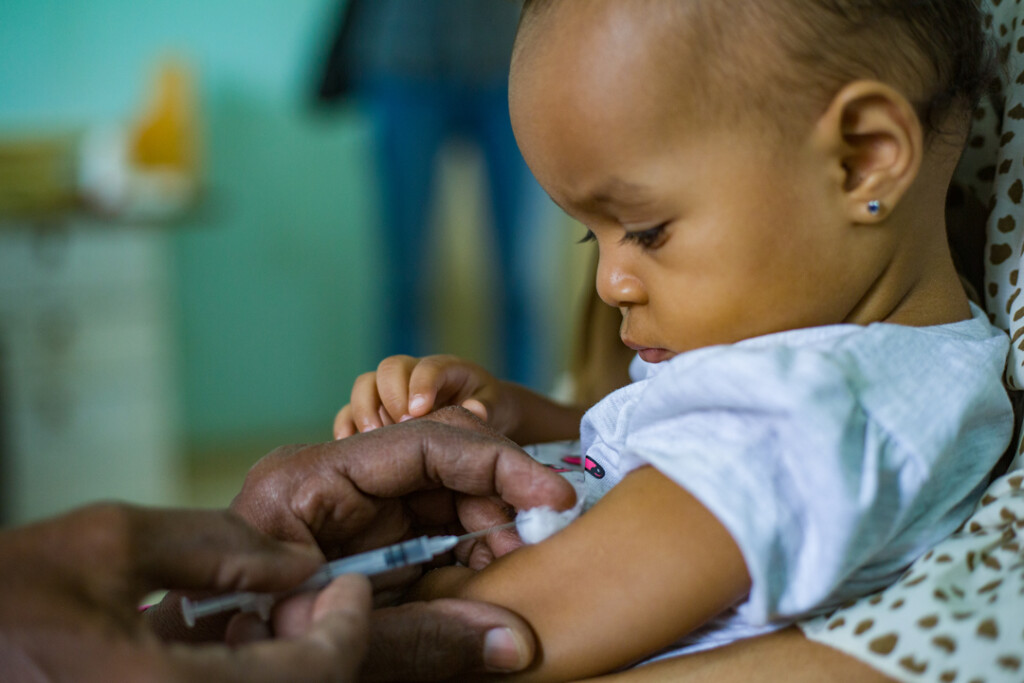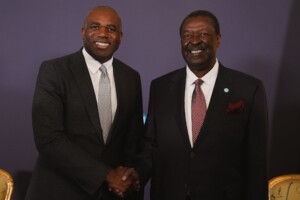UN: ‘700k+ children unvaccinated as immunisation plummets in Sudan’

Lugain Asim Alhadi is held by her mother, while being immunised at Gezirat El Feel Health Centre in Sudan in May 2023 (Photo: Ahmed Mohamdeen Elfatih / UNICEF)
After 15 months of war, Sudan has experiencing the steepest fall in child vaccination globally, with coverage rates falling from 75 per cent in 2022 to 57 per cent in 2023, according to the latest global immunisation estimates for 2023 released by the World Health Organisation (WHO) and the UN Children’s Emergency Fund (UNICEF) today. Almost 701,000 children in Sudan were not vaccinated at all against killer diseases such as measles and diphtheria last year.
The WHO and UNICEF figures, based on data from 194 countries, show that global childhood immunisation coverage stalled in 2023, leaving 2.7 million additional children un- and under-vaccinated compared to pre-pandemic levels in 2019. The estimates of national immunisation coverage (WUENIC) – which provide the world’s largest and most comprehensive dataset on immunisation trends for vaccinations against 14 diseases – underscore the need for ongoing catch-up, recovery and system-strengthening efforts, a joint WHO-UNICEF statement highlights.
According to the findings, the number of children who received three doses of the vaccine against diphtheria, tetanus and pertussis (DTP) in 2023 – a key marker for global immunisation coverage – stalled at 84 per cent (108 million). However, the number of children who did not receive a single dose of the vaccine increased from 13.9 million in 2022 to 14.5 million in 2023.
More than half of unvaccinated children live in the 31 countries with fragile, conflict-affected and vulnerable settings, where children are especially vulnerable to preventable diseases because of disruptions and lack of access to security, nutrition, and health services.
Additionally, 6.5 million children did not complete their third dose of the DTP vaccine, which is necessary to achieve disease protection in infancy and early childhood.
The figures show that in 2023, Sudan joined the list 10 countries that are home to more than half of the zero-dose’ children. Unicef’s Sudan representative, Douglas Hageman, points out that the country’s health system has collapsed during the war.
“Immunisation stands as one of humanity’s greatest achievements, and it has saved over 154 million lives over the past 50 years, with measles vaccination alone responsible for about 60 per cent of this,” noted Dr Ephrem Lemango, UNICEF’s global head of immunisation.
“And yet, measles outbreaks continue to rise as measles vaccination coverage stalls. For example, the world saw over 300,000 confirmed measles cases in 2023 which is an almost threefold increase compared to what we had in 2022.”
As reported by Radio Dabanga in June, sources in South Darfur indicate a concerning rise in potential polio cases. A sheikh living in Kalma camp near to Nyala warned of potential polio and other childhood diseases due to halted vaccination programmes, although he said that “some immunisation efforts had recently resumed”.
In April, a vaccination campaign started in Nyala and several other places in the state, however, a South Darfur health official told Radio Dabanga that 13 of the state’s 21 localities are not included because of insufficient financial means.
Also in April, a six-day measles rubella vaccination campaign targeted about 1,360,500 children in Sennar state. Médecins Sans Frontières (MSF) reported a rise of suspected cases of measles and malnutrition among children in Sudan in August 2023. MSF was providing routine immunisation services to 30 to 40 children in White Nile state each day but said a mass vaccination campaign was needed. A month later, the UN High Commissioner for Refugees (UNHCR) sounded the alarm on a measles outbreak in White Nile state.
In mid-November, 2.2 million cholera and 7.5 million measles rubella vaccines were airlifted to Port Sudan for distribution to combat disease outbreaks across Sudan, in a collaborative effort by the World Health Organisation (WHO) and UNICEF.
Radio Dabanga reported earlier this year on the further spread of measles in various parts of the country.











 and then
and then